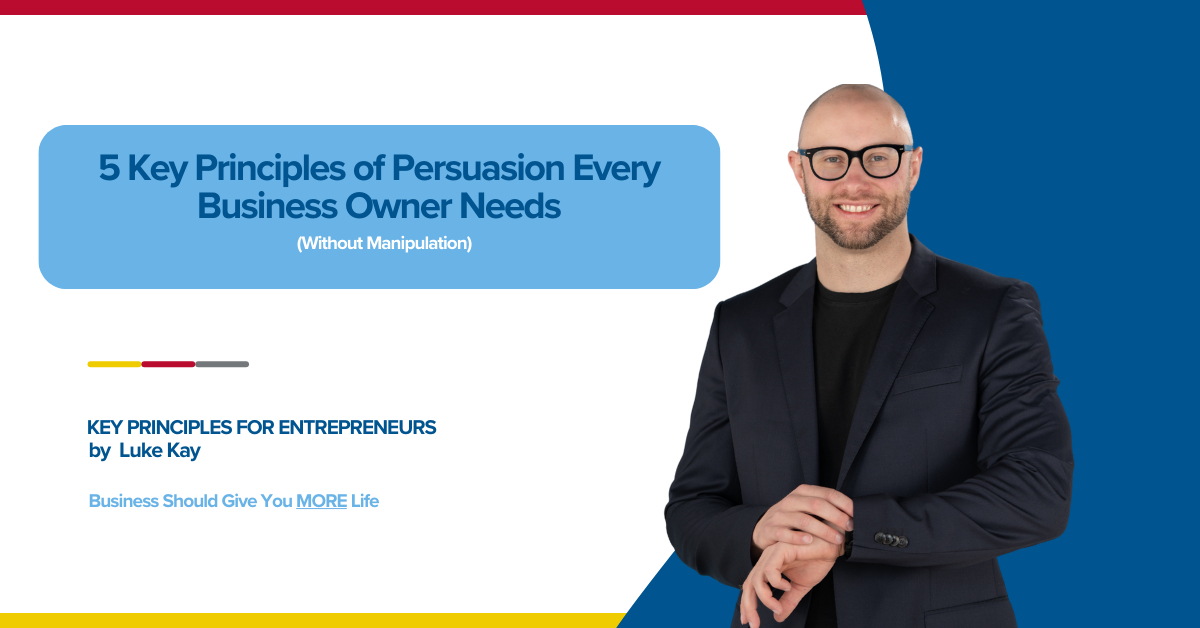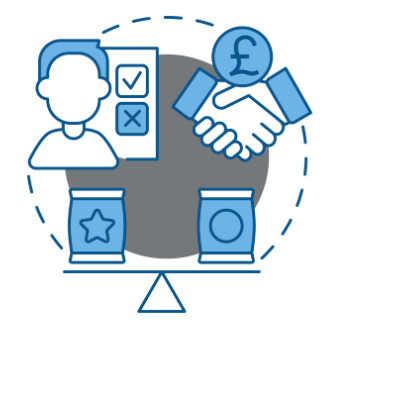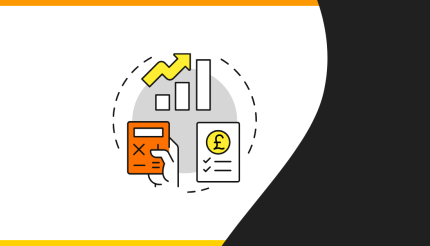
Most business owners cringe when they hear the word “selling.”
It brings up images of pushy pitches, awkward silences, and people tuning out before you’ve even made your point.
But here’s the thing, persuasion isn’t about slick talk or forcing someone’s hand. It’s about communication. It’s about helping someone see why your solution matters to them.
Done right, persuasion feels natural, like a good conversation with a friend who just “gets it.” The kind where you walk away thinking, “That makes sense, I want that.”
Let’s get into it and break down five key principles of persuasion to master in your business, backed up by real UK case studies.
Key Principle #1: Lead with Understanding, Not Your Agenda
People don’t want to be “sold to.” They want to be understood.
Persuasion starts by listening, asking questions, and showing you care about their situation. When people feel seen, they’re far more open to hearing what you have to say.
Key Principle #1 Case Study: Leon Restaurants
When Leon opened in London, they didn’t try to compete with fast-food giants on speed or price. Instead, they listened to health-conscious workers who wanted quick meals without feeling guilty. They built menus around that need , “naturally fast food.”
By leading with understanding, Leon didn’t have to shout about why they were better. Customers felt like Leon “got them,” and the brand grew rapidly across the UK.
Before you pitch, ask: “What’s frustrating you most about this right now?” Let them talk, then show how your solution connects directly to their pain point.

Key Principle #2: Guide, Don’t Push
The most persuasive people don’t shove an answer down your throat. They don’t sit there rattling off a list of features hoping something sticks. Nah, they guide you.
Think of it like showing a mate around your hometown. You don’t drag them by the arm saying, “You’ve got to eat here, you’ve got to drink there.” You ask, “What do you fancy? Big night out or a quiet pint? Fancy some proper scran or just a chippy tea?”
Before they know it, they’ve picked the spot themselves, but you led them there with the right questions. And because it was their choice, they’re buzzing about it.
It’s the same in business. When you ask the right questions, your prospect connects the dots in their own head. They see the value for themselves. And here’s the magic bit: when it’s their decision, they’ll back it a hundred times more than if you’d just told them what to do.
Key Principle #2 Case Study: Abel & Cole
Abel & Cole didn’t build their organic food delivery service by saying, “You should eat organic.” They guided their customers through stories and questions: “Do you know where your food comes from?” or “How much better would it feel to know your veg was farmed sustainably?”
This gentle guidance helped people make the choice themselves. As a result, Abel & Cole built a loyal customer base long before organic was mainstream.
Replace statements with questions. Instead of saying “You need this,” ask “What difference would it make if this problem disappeared?”
Key Principle #3: Build Small “Yeses”
Persuasion’s a bit like building up speed when you’re pushing a car, you don’t start by shoving it full force, do you? You give it a little nudge, get it rolling, and before you know it, the big push feels easy.
It’s the same in business conversations. Start small. Ask the kind of questions no one’s going to argue with. Little, harmless ones that get a quick “yeah” or a nod of the head.
Each “yes” is like giving the car another shove down the road. Before long, the bigger yes, the one that actually matters, doesn’t feel forced. It feels natural.
That’s the magic. You’re not dragging someone over the line — you’re walking alongside them, bit by bit, until saying yes is the obvious next step.
Key Principle #3 Case Study: Deliveroo
Deliveroo didn’t jump straight to asking customers to trust them with dinner every night. They built small yeses through promotions like “Try us for lunch today” or “Get your first delivery free.” Those tiny agreements lowered the barrier and got people used to saying yes.
Once customers had said yes a few times, they became repeat users, eventually making Deliveroo one of the UK’s biggest delivery platforms.
In a sales chat, try: “Would you agree saving two hours a week would help your team?” A string of easy yeses leads to the bigger yes.

Key Principle 4: Raise and Reframe Objections
Objections aren’t the end of the road, they’re actually a good sign.
When someone raises a concern, it shows they’re taking you seriously. They’re not dismissing you, they’re thinking it through. The worst thing you can do is dodge it or hope it doesn’t come up. Be one step ahead. Bring it up yourself. That way, you keep the trust and the control of the conversation.
And when you do, flip it on its head.
For example: “You might be worried about the price, fair enough, most people are. But here’s the thing: what’s it costing you to stick with things the way they are? Which one’s actually more expensive in the long run?”
That’s the power move. You don’t shut down the objection, you reframe it in a way that makes sense to them. Done right, what started as a “maybe not” can turn into a confident “yes.”
Key Principle #4 Case Study: MADE.com
When MADE.com first launched, customers worried about buying furniture online without “trying before buying.” Instead of dodging that objection, MADE leaned in: they created showrooms and an easy returns policy, reframing the objection into reassurance.
This transparency turned doubt into trust, helping MADE.com carve out a loyal customer base before being acquired in 2022.
Takeaway for you: Anticipate the pushback. Say: “You might be worried about cost — and that’s fair. But let me show you how it saves you more in the long run.”

Key Principle #5: Anchor with Comparisons
People don’t decide in a vacuum. They always line things up side by side.
“Do I go for this one… or that one?”
That’s where anchoring comes in. Put your offer next to the dull, costly, or time-wasting alternative, and suddenly your value shines brighter than the Liver Building on a sunny day.
Make the choice obvious, and watch how quickly they say “sound, I’ll take it.”
Key Principle #5 Case Study: Bulb Energy
Bulb entered a crowded market dominated by traditional energy suppliers. Instead of saying, “We’re cheaper,” they anchored against the old system: “We’re 100% renewable, transparent, and easy to switch — unlike the Big Six.”
That comparison made the choice obvious. Bulb signed up over a million customers before being acquired.
Frame your offer next to the cost of doing nothing, or the less attractive alternative. For example: “Hiring another admin person will cost £25k a year. Our software does the same job for a fraction of that.”

5 Strategies To Start Using This Week:
Persuasion isn’t about clever lines or pushy tactics.
- Listen first : Ask questions, uncover pain points, and show genuine curiosity before you pitch.
- Guide, don’t push: Use open-ended questions that help clients see the value for themselves.
- Build momentum: Stack small agreements (“yeses”) to naturally lead to bigger commitments.
- Tackle concerns upfront: Raise common objections yourself and reframe them as opportunities.
- Frame with clarity: Use comparisons to make your offer the obvious choice.
Do these consistently, and you won’t just make more sales, you’ll build long-term relationships that grow your business.
Take Action
Want to sharpen your persuasion skills so sales feel effortless, not awkward? Book a free clarity call today. Let’s work on making your communication your biggest growth tool.
Our Events
Grow Faster, With People Who Get It
Running a business can feel like you’re spinning plates on your own. The pressure, the decisions, the late nights, no one around you really gets it.
That’s where our monthly events, part of our Entrepreneurship Academy and 1-2-1 Business Coaching Programmes, come in. Regular half-day business growth MasterCLASSes and our quarterly 90-Day Planning events, honest chats, fresh strategies, all with ambitious folks who know exactly what you’re juggling.
First time? Come along for free. No sales pitch. Just a session that could proper change your game.






